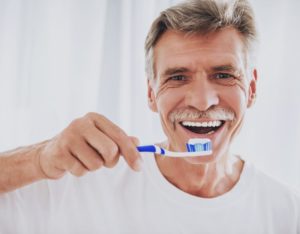6 Bad Tooth Brushing Habits Your Dentist near Tryon Says You Need to Quit
June 28, 2019

Brushing your teeth is an easy enough habit to stick into our daily routine. But did you know that many of us don’t actually do it correctly? This means that we aren’t getting all the benefits that brushing has to offer. Let’s look at 6 bad brushing habits that your dentist near Tryon suggests you quit.
1. Using the Wrong Brush
Some of us pick a toothbrush based on the way it looks rather than how well it does its job. Maybe we pick a brush with hard bristles, thinking it will clean better. But it’s actually the opposite. Brushes with soft bristles do a better job of cleaning. Hard bristles can actually damage your enamel, which causes tooth sensitivity later on.
2. Brushing Too Hard
In addition to choosing hard bristles, many of us apply too much pressure when brushing. You don’t actually need to scrub that hard. Plaque is soft and loose, so that’s the way you should brush. Using too much force can wear down the outer layer of your teeth. Instead of thinking of brushing as “scrubbing,” think of it more like “massaging.” Use just enough pressure to remove the plaque without hurting your teeth.
3. Not Spending Enough Time on Brushing
You should spend 2 minutes brushing your teeth, but a lot of people don’t. Maybe you’re running late for school or work, or you’re too tired before bed to spend more than a few seconds on brushing. But anything less than two minutes is typically not long enough to remove plaque.
Luckily, there are a couple ways to make sure you brush for the required length of time. You could set a timer on your phone for two minutes. Or, since a lot of pop songs are between 2 and 3 minutes, you could listen to your favorite song while brushing. That can make the time go by a lot faster.
4. Holding on to a Brush for Too Long
Sometimes you might get attached to a toothbrush. Or maybe you just don’t get around to switching it out with a new one. But sticking with the same brush until its bristles are frayed can do more harm than good. Once the bristles become bent, discolored, or dirty looking, it’s time to change it.
A good rule of thumb is to replace your brush every 3 to 4 months. If you’ve been sick recently, change it as soon as you recover to keep from getting sick again. Keep your brush in the open air to dry. This prevents bacteria or mold from growing on it when it’s wet.
5. Neglecting the Gum Line
You might do a stellar job of brushing the chewing surfaces of your teeth, but you’re still very susceptible to decay if you don’t brush along the area where tooth meets gum. Bacteria like to hang out in that spot. Brush at a 45-degree angle against the gum line to eliminate those bacteria.
6. Brushing Immediately After Eating
Brushing right after you eat is certainly better than not brushing at all. However, it’s healthier to wait about 15-30 minutes after eating. Why? You have acid from your food sitting in your mouth, and brushing while those acids are there can be abrasive on your teeth. Waiting a while can give your saliva enough time to deal with the acid first.
Brushing your teeth is an excellent habit, even though many of us do it wrong. However, start implementing these habits to keep plaque and tooth decay at bay. And remember to visit your dentist at least once every six months to maintain great oral health.
About the Author
Dr. John Moneyhun earned his Doctor of Dental Medicine degree at MUSC in 2016. He also won the South Carolina Dental Association award for outstanding scholastic accomplishments and clinical abilities. For more info on how you can brush your teeth more effectively, click here or call (864)-457-3901.
No Comments
No comments yet.
RSS feed for comments on this post.
Sorry, the comment form is closed at this time.


